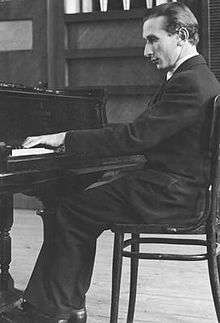Alexander Uninsky
Alexander Uninsky (Ukrainian: Олекса́ндр Юні́нський; Russian: Александр Юнинский, romanized: Aleksandr Yuninskij, pronounced You-nin-skee; Kiev, 2 February [O.S. 20 January] 1910 – Dallas, 19 December 1972) was an American classical pianist of Ukrainian origin.

Life and career
Alexander Uninsky was born in Kiev (then in the Russian Empire, now in Ukraine). He initially studied piano there in the conservatory which had been opened in 1913, and whose other graduates included Vladimir Horowitz and Alexander Brailowsky.[1]
He subsequently moved to Paris in 1923, where he studied with Lazare Lévy. He was awarded the conservatory's first prize for piano. In 1932 he won the second International Frédéric Chopin Piano Competition.[2] In fact, Uninsky tied for first place with the blind Hungarian pianist Imre Ungar, and the judges decided to award victory on the basis of the toss of a coin. Ungar lost.
In 1955, he took up a teaching post at the Toronto Conservatory of Music, where he numbered among his pupils the Canadian composer Bruce Mather. Mather commemorated his teacher in his 1974 composition In memoriam Alexander Uninsky[3]
Subsequently he taught at the Southern Methodist University in Dallas, Texas. His pupils included Jeffrey Swann, David Morgan, Carmen Alvarez, Boaz Heilman, Dr. Henry Doskey, David Golub and Dubravka Tomšič Srebotnjak.
He played his last concert in San Jose, Costa Rica, on October 19, 1972 for the celebration of the 75th anniversary of the National Theatre. He played Tchaikovsky's Piano Concerto #1 Opus 23 with the Costa Rican National Symphony Orchestra conducted by Gerald Brown. He was suffering an advanced arthritis.
He committed suicide two months later, in December 19, 1972 in Dallas, Texas, aged 62.
Recorded legacy and reputation
Uninsky was quickly signed up in the early 1950s by the newly formed Philips recording company. His Chopin playing is well represented in his recordings, including the complete Études, recorded in the 1950s, the complete Mazurkas and Impromptus recorded between 1959 and 1971, the Scherzos and Waltzes, as well as the piano concertos. His other recordings included works by Liszt.
His style is greatly reminiscent of Nikita Magaloff, who underwent the same influences of pre-revolutionary Russia and post-revolutionary Paris. His playing is unsentimental and elegant, but with a rubato that marks him as coming from an essentially early twentieth century aesthetic. It is not surprising that his clean, sober playing impressed the jury of the second Chopin Competition, which has been founded to combat the mannered, virtuoso tradition of Chopin playing which had marked the late 19th century.[2] An indication of the 'modernness' of Uninsky's playing comes from a comment by Dinu Lipatti in a review he wrote in 1937 for Libertatea in which he says "How is it possible that Emil Sauer must play in the small Salle Érard, despite his glorious past, when a Brailowsky or Uninsky can pack the Salle Pleyel?" [4]
Recordings
- Fr. Chopin: Polonaises (Nos. 1-6), Epic Records LP -LC 3623
- Fr. Chopin: Etüden, Philips LP Nr. A 00405 L undated
- Fr. Chopin: Klavierkonzert Nr. 1 e-moll op.11, Das Residenz-Orchester Den Haag (W.Van Oterloo Dir.), Philips LP Nr. A 00651 R 1958
- Fr. Chopin: Klavierkonzert Nr. 1 e-moll op.11, Fontana Weltserie Folge 34 LP Nr. 695 033 Kl undated
- Fr. Chopin: Polonaise Nr. 6 As-dur op. 53 e-moll op.11, Fontana Weltserie Folge 34 LP Nr. 695 033 Kl undated
References
- "Grigory Kogan". Archived from the original on 2006-12-12. Retrieved 2007-01-08.
- "Andrzej Jasinski Special message from Warsaw. Undated, Chopin Foundation of the United States" (PDF). Archived from the original (PDF) on 2011-07-23. Retrieved 2009-04-29.
- Bruce Mather's web page
- Marston - Biography of Emil von Sauer on the Marston Records website Archived 2006-06-14 at the Wayback Machine
External links
- Archive photo of Uninsky
- Spanish concert programme from 1942 with photo and brief biography which was used as one of the sources for this entry.